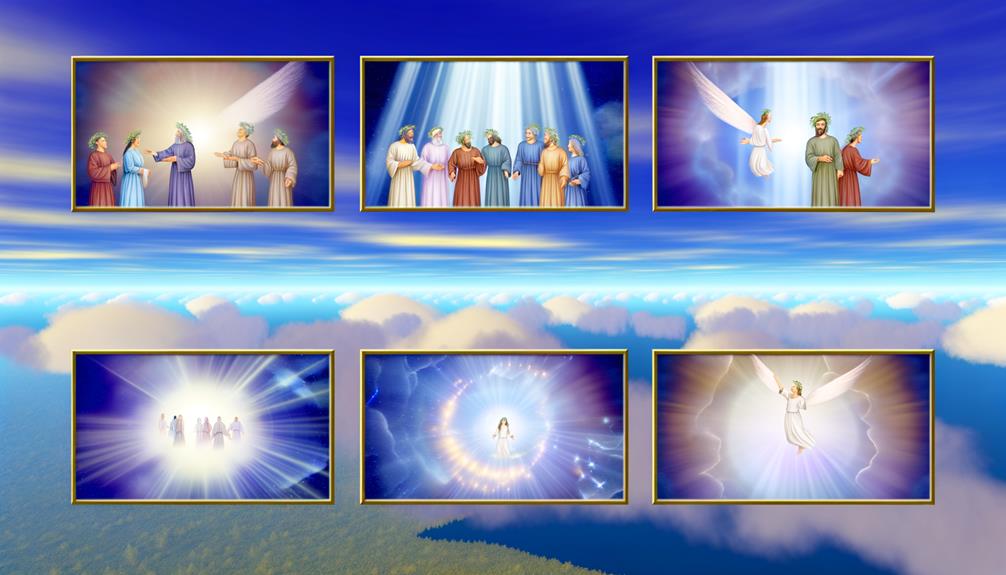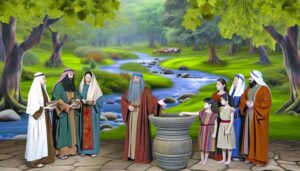Meaning of Enchantment in the Bible: Biblical Warning
In the Bible, enchantment refers to sorcery or divination, practices firmly condemned by God. These acts aim to manipulate supernatural forces for personal gain, often linked to idolatry and false prophecies, contravening divine sovereignty and seeking knowledge beyond God’s revealed means.
Key scriptures like Deuteronomy 18:10-12 and Galatians 5:19-21 explicitly prohibit such practices, emphasizing faith, obedience, and reliance on God for guidance. Enchantment symbolizes rebellion and spiritual corruption, making it a significant concept in understanding divine expectations and maintaining spiritual purity.
Explore further to uncover the deeper theological implications and historical context.

Biblical Meaning of Enchantment: Forbidden Magic and Deception
| Aspect | Details |
|---|---|
| Term | Enchantment |
| Biblical References | Deuteronomy 18:10–12, Isaiah 47:9–13, Exodus 7:11 |
| Hebrew Word | Lahash, Keshaphim — whispering spell, sorcery |
| Spiritual Symbolism | Deception, manipulation, rebellion against God |
| Biblical Stance | Strongly condemned as part of occult and pagan practices |
| Modern Biblical Insight | Symbolizes false spiritual power and distraction from divine truth |
Biblical Definition of Enchantment

In the Bible, enchantment is often depicted as a form of sorcery or divination that is expressly condemned by God. The term encompasses practices aimed at manipulating supernatural forces to achieve personal gain or influence.
Scriptural references, primarily in the context of prohibitive laws, underscore its association with idolatry and false prophecy. Enchantment is seen as a direct affront to divine sovereignty, as it seeks knowledge and power outside of God’s ordained means.
This theological stance highlights a critical dichotomy between divine revelation and human attempts to control the spiritual domain. The biblical definition serves as a caution against reliance on occult practices, emphasizing the importance of faith and obedience to God’s commandments.
Enchantment in Old Testament

Numerous passages in the Old Scripture explicitly denounce enchantment, portraying it as a severe violation of the covenantal relationship between God and His people.
For instance, Deuteronomy 18:10-12 lists enchantment alongside other detestable practices that the Israelites are to avoid, underscoring its incompatibility with divine worship.
The Hebrew term often translated as ‘enchantment’ encompasses various forms of sorcery and divination, which are seen as attempts to circumvent God’s sovereignty.
The narrative of King Saul consulting the Witch of Endor (1 Samuel 28) further illustrates the gravity of turning to enchantment, resulting in dire consequences.
These examples reflect a consistent theological stance against practices that undermine faith in Yahweh’s ultimate authority and providence.
Forbidden Practices in Scripture

Scripture explicitly forbids practices such as ancient divination and sorcery, categorizing them as abominations that deviate from God’s will.
In passages like Deuteronomy 18:10-12, the Bible delineates these prohibitions to maintain the spiritual purity and fidelity of the faithful.
Ancient Divination Prohibitions
Frequently, the Bible explicitly condemns various forms of ancient divination, underscoring a clear prohibition against practices deemed incompatible with faith in God.
In Deuteronomy 18:10-12, the text specifically forbids divination, soothsaying, interpreting omens, and engaging in witchcraft. These practices, seen as attempts to circumvent divine authority, are identified as ‘detestable’ to the Lord.
The admonitions against divination serve to reinforce the exclusive worship and reliance on God for guidance and wisdom. By prohibiting such practices, Scripture seeks to protect the spiritual integrity of the faith community, emphasizing that true understanding and direction come solely from a relationship with God, rather than through manipulative or occult means.
This underscores the Bible’s overarching theme of fidelity to divine revelation.
Sorcery and Witchcraft Bans
The Bible unequivocally condemns sorcery and witchcraft, categorizing these practices as severe transgressions against the sanctity of faith in God.
Scriptural texts such as Deuteronomy 18:10-12 and Leviticus 19:26 explicitly prohibit these acts, aligning them with idolatry and rebellion. These prohibitions underscore a theological framework that prioritizes divine sovereignty and purity of worship.
The severity of these bans is further emphasized in the New Covenant, where practices of sorcery are depicted as works of the flesh, opposed to the Holy Spirit (Galatians 5:19-21).
The consistent biblical narrative presents sorcery and witchcraft not merely as cultural taboos but as profound violations of the covenantal relationship between God and His people.
Prophets and Miraculous Acts

In exploring the role of prophets and miraculous acts within the biblical narrative, it is essential to contemplate instances of divine intervention that underscore God’s active participation in human affairs.
These miraculous acts, often performed by prophets, serve as profound signs of divine authority and purpose.
Divine Intervention Examples
Examining instances of divine intervention in the Bible reveals a rich tapestry of prophetic proclamations and miraculous acts that underscore the profound connection between the divine and humanity.
Prophets such as Elijah and Elisha performed miracles that defied natural laws, including the resurrection of the dead and the multiplication of resources. These acts served as tangible evidence of God’s omnipotence and His active presence in human affairs.
Similarly, the parting of the Red Sea by Moses and the healing miracles of Jesus Christ illustrate divine intervention as a means to guide, protect, and heal the faithful.
These events are not mere historical anecdotes but foundational elements that reinforce the theological assertion of a responsive and engaged deity.
Prophetic Signs Explained
Prophetic signs in the Bible, manifested through miraculous acts performed by prophets, serve as divine instruments to communicate God’s will and authenticate His messengers. These acts, ranging from the parting of the Red Sea by Moses to Elijah calling down fire from heaven, underscore the divine authority vested in these individuals.
Such signs are not mere displays of power but are imbued with profound theological significance, directing the faithful towards deeper spiritual truths.
| Prophet | Miraculous Act |
|---|---|
| Moses | Parting of the Red Sea |
| Elijah | Calling down fire from heaven |
| Elisha | Multiplication of oil and resurrection |
| Isaiah | Healing of King Hezekiah |
These acts serve to validate the prophetic message and reinforce faith in God’s omnipotence and covenantal promises.
Jesus and Supernatural Events

While the Gospels recount numerous supernatural events associated with Jesus, each instance serves to substantiate His divine authority and messianic identity.
Miracles such as turning water into wine, healing the sick, and raising the dead illustrate Jesus’ mastery over nature and human suffering. These acts are not mere enchantments but profound signs pointing to His unique role in salvation history.
The transfiguration, where Jesus’ divine glory is revealed, further underscores His connection to the divine. In theological terms, these events are manifestations of divine intervention, affirming Jesus as the incarnate Word.
Consequently, the supernatural events in Jesus’ ministry are pivotal in revealing the deeper spiritual truths and validating His messianic mission as prophesied in the Scriptures.
Apostles and Divine Wonders

The apostles, empowered by the Holy Spirit, performed numerous divine wonders that served as tangible evidence of their apostolic authority and the truth of the Gospel message.
These miraculous acts, such as healing the sick, raising the dead, and casting out demons, were not merely displays of power but crucial affirmations of divine endorsement.
Through these wonders, the apostles demonstrated that their teachings were divinely inspired and aligned with Jesus’ ministry.
This supernatural empowerment also facilitated the rapid spread of Christianity, as witnesses of these miracles were often moved to faith.
Analyzing these events within the biblical context, one observes that divine wonders were integral to establishing the early Church’s credibility and fostering a robust, faith-filled community.
Warnings Against Sorcery

In numerous instances, Scripture explicitly warns against the practice of sorcery, highlighting its incompatibility with the faith and teachings of the Bible.
Verses such as Deuteronomy 18:10-12 and Galatians 5:19-21 unequivocally condemn sorcery, categorizing it alongside other forms of idolatry and moral transgressions.
The biblical narrative often associates sorcery with pagan practices that lead believers astray from God’s commandments.
This stern admonition underscores the inherent dangers of seeking power or knowledge through means contrary to divine revelation.
Spiritual Significance of Enchantment

Acknowledging the Bible’s stringent warnings against sorcery, it is equally important to explore the nuanced spiritual significance of enchantment within the broader scriptural context.
Enchantment, often linked with idolatry and false gods, symbolizes the perversion of divine authority and the human propensity to seek power outside of God’s will.
Scripturally, enchantment serves as a poignant reminder of the spiritual warfare between God’s sovereignty and malevolent forces. For instance, the story of Pharaoh’s magicians in Exodus contrasts divine miracles with deceptive enchantments, highlighting God’s supreme power.
Enchantment, consequently, not only represents rebellion against divine order but also underscores the importance of faithfulness and discernment. Such narratives encourage believers to rely solely on God’s wisdom and guidance.
Modern Implications for Believers

Understanding the modern implications of enchantment for believers necessitates a discerning approach to spiritual practices and influences in contemporary society. This entails distinguishing between God-honoring spiritual experiences and those that may lead believers astray. One must consider the ethical, theological, and practical dimensions of enchantment in today’s world.
| Dimension | Consideration | Example |
|---|---|---|
| Ethical | Aligning with Christian morals | Avoiding occult practices |
| Theological | Consistency with Biblical doctrine | Examining scriptural references |
| Practical | Application in daily life | Discernment in media consumption |
Conclusion
Enchantment, as delineated in biblical texts, encompasses a range of supernatural activities often condemned as contrary to divine will.
What, then, is the spiritual significance of such prohibitions for contemporary believers?
By examining biblical accounts of prophets, Jesus, and apostles performing divine wonders, and contrasting these with warnings against sorcery, a nuanced understanding emerges.
This analysis underscores a call for discernment and faithfulness, guiding modern believers in maneuvering the complexities of spiritual practices within a biblical framework.






